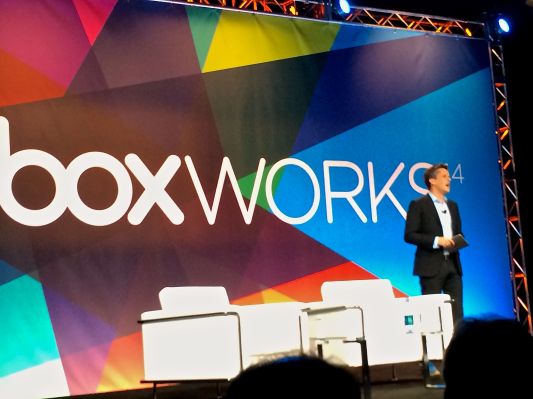Box, a company that started almost a decade ago as a means of getting your files online, is maturing into a more full-service content management platform, but CEO Aaron Levie says you needn’t worry about it turning into a more traditional vendor. He says richer features announced yesterday at the company’s BoxWorks customer conference have been created in the context of the platform and customer requirements, not to mimic earlier products.
When I last attended BoxWorks two years ago, I heard analysts complain about a couple of key issues from Box: lack of metadata support and any real workflow. Box put those two criticisms to rest yesterday when it announced a new metadata service and new workflow engine built on the Box platform. And as though to emphasize its growing maturity, it also announced a new vertical focus, an idea for providing a distinct set of services designed with help from third parties to give a particular industry the tools they need to use Box successfully.
It’s worth noting Box has been talking about metadata and workflow for some time, but the details were somewhat murky up until now. In an interview yesterday with TechCrunch, Levie emphasized the focus has always been on the customer, not to take his company back to some ’90s vision of content management or to match analysts’ expectations of what the company should be.
He said even though they are adding features that were part of more traditional content management products like Microsoft SharePoint and EMC Documentum, it doesn’t mean the company is moving toward that vision of content management, quite the opposite.
“We think content management is changing and the nature of content management is moving more toward Box, than we are building something that looks like [a ’90s] content management system. ” He said the feature similarity could end up creating these false comparisons with Documentum or SharePoint, but he says Box has always been about overturning that view of enterprise software.
“Our platform works the way people work,” he insisted. “We didn’t [add these features] because Documentum [or any other content management vendor] has metadata workflow. We did it because the way customers interact with the content demanded metadata and workflow. It happens to be that many of the things by name resemble things in the past, but [it’s in the context of our platform],” he explained.
He said Box wants to simplify these things for customers and build the tools people need to do their work in a mobile world. It happens that they need metadata and workflow to provide a more complete user experience in an enterprise context.
Levie also rejected the notion that this is about storage as some have suggested. Storage in his view is just a piece of the content management puzzle, not the business model. Even though Box has often gotten lumped into that category, he says it’s not its main focus and it took steps to ensure it was not a concern for customers. “We took this to the logical extreme when we introduced unlimited storage. We are giving businesses unlimited space.”
As he pointed out, it’s hard to make money in storage as the cost races very quickly toward zero. He added, storage has always been a means to an end for Box, not the main mission and it’s not where the product value lies. It’s just part of the underlying platform.
“We add value by building better software and use cases on top of that platform,” Levie said.
The new vertical focus takes this idea further. He said on stage yesterday companies were “innovating through the use of information.” The new Box for Industries initiative announced yesterday is supposed to address the unique challenges each industry faces, rather than giving everyone the same generic set of tools.
The danger in this approach is sacrificing the core platform in the name of the verticals, but Levie said in a post keynote press conference, they recognized this danger and have been working hard to make sure it doesn’t happen. He said the company actually studied other organizations who had done this to avoid the pitfalls of focusing too hard on verticals, but he said they always try to keep their eye on the platform.
Sam Schillace, svp of engineering at Box added if you prioritize the platform, you can avoid the problem of becoming too vertical-centric. He said they didn’t start building a metadata model for retail or any other vertical. They built metadata into the platform and then they could tune it to retail or anything else. The value he explained is in taking advantage of a base set of features, then reusing them across different requirements.
As Box heads toward a decade in business, it may be hard to continue to see them as the plucky upstarts, but Levie insists he wants his company to have that same mentality. “We have a start-up oriented culture,” he said. “That’s how you innovate.”
He pointed out there is no exact definition anyway. “As long as you have incumbents you are still going after, you’re an upstart.” As he said, “Microsoft certainly wouldn’t call us an incumbent.” And he’s probably right.
